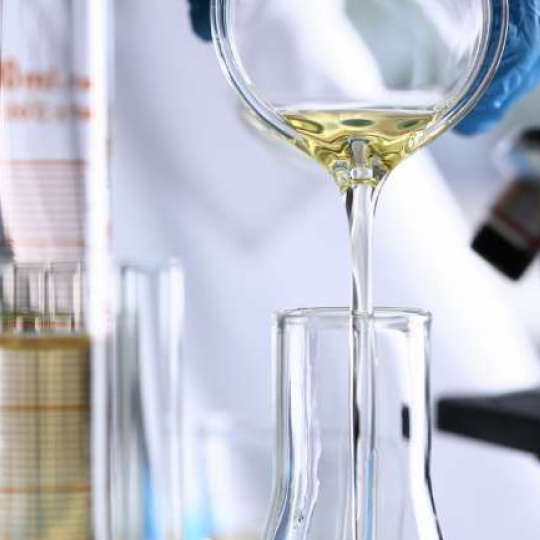Residual Solvent Testing

At Nova Analytic Labs, we specialize in the vital area of Residual Solvent Testing and Analysis. Our primary goal is to ensure the production of the highest quality concentrates and products while verifying the integrity of the producer’s process. We are well-aware that chemical solvent impurities can significantly impact the health of the end user, hence the necessity of thorough and accurate testing.
Our specialty lies not only in cannabis and hemp product testing, but extends to a wide range of other industries that require similar services. From pharmaceuticals to food and beverages, our expertise in residual solvent testing is industry-agnostic and caters to any business aiming to assure product safety and quality.
Residual solvents are chemicals utilized in the extraction process of various products. While these solvents are generally removed after extraction, traces can sometimes remain, and these residual chemicals can potentially compromise product safety and efficacy. Therefore, Residual Solvent Testing and Analysis is crucial to verify that these solvents are absent or within acceptable, safe limits.
Our comprehensive testing aligns with the strictest regulatory requirements. For instance, the state of Maine mandates testing for approximately 20 different solvents in all products, except for dried flower. This regulation helps ensure that products are safe and that consumers are protected.
The list of required chemicals for testing in Maine includes:
- Acetone
- Acetonitrile
- Butanes
- Ethanol
- Ethyl Acetate
- Ethyl Ether
- Heptane**
- Hexane
- Isopropyl Alcohol
- Methanol
- Pentane
- Propane
- Toluene**
- Total Xylenes (ortho, meta, para) **
- 1,2-Dichloroethane
- Benzene**
- Chloroform
- Ethylene Oxide
- Methylene Chloride
- Trichloroethylene
At Nova Analytic Labs, we are equipped and experienced in testing for all these solvents and more. Our comprehensive approach ensures that we can accurately detect and quantify the presence of any residual solvents.
The legal cannabis industry has experienced rapid growth and evolution, making safety regulations and quality control increasingly important. At Nova Analytic Labs, we have a special focus on providing top-tier residual solvent testing and analysis for cannabis products. Cannabis concentrates and extracts are often produced using a variety of solvents to separate the desired compounds from the plant material. This extraction process can sometimes leave residual solvents that, if not properly purged, could impact product safety, quality, and efficacy. We accurately identify and quantify any residual solvents, ensuring that cannabis products meet regulatory standards and are safe for consumption. Our proficiency in cannabis residual solvent testing means we can effectively assist growers, manufacturers, and dispensaries in ensuring their products’ safety and compliance, thereby protecting both their businesses and their consumers.
We utilize state-of-the-art equipment and methodologies in our Residual Solvent Testing process. With advanced techniques such as Gas Chromatography-Mass Spectrometry (GC-MS), we can accurately identify and quantify residual solvents, providing you with a complete analysis of your product.
Our commitment to precision, transparency, and compliance sets us apart, ensuring that your product aligns with all safety and quality standards. Furthermore, our rapid turnaround times and dedicated customer service means you can trust in a swift, thorough and professional service.
Choose Nova Analytic Labs for all your Residual Solvent Testing and Analysis needs. Reach out to us today to learn more about our comprehensive testing solutions.
Residual solvents refer to trace amounts of chemicals that may remain after the extraction and purification processes used to produce cannabis concentrates and oils. Testing is vital for consumer safety, regulatory compliance, and process refinements.
Many methods utilize solvents like butane or ethanol to extract desired compounds from plant materials. While most solvents fully evaporate or get removed in post-processing, small residual amounts may dissolve and remain in the final products. Testing helps ensure these traces do not exceed toxicity limits with repeated exposure over time. It also signals diligence around production quality for safety.
- Consumer safety – Residuals can be toxic if inhaled over time
- Regulatory compliance – States set action limits for solvent residues
- Process refinements – Data helps optimize methods to remove traces
We test for over 60 Class 1, 2 & 3 residual solvents that pose varying levels of risk at trace amounts when exposed through consumption. Testing covers a safety range beyond minimum state requirements.
Class 1 solvents pose the most toxicity risks from repeated exposure. We test for hazardous compounds like benzene, methylene chloride, and 1,2-dichloroethane that require limits at parts per million levels in finished products.
- Class 1 solvents pose the most risk for toxicity issues from repeated exposure. We test for hazardous compounds like benzene, methylene chloride, and 1,2-dichloroethane.
- Class 2 contains solvents with lower risk levels at trace amounts. Acetone, acetonitrile, and isopropyl alcohol fall under this classification.
- Class 3 represents the least toxic group including ethanol and butane popular in extractions.
Manufacturers can correlate adjustments to processes with observed reductions in residuals over product cohorts, signaling enhanced diligence around purity and safety for consumers.
- For Manufacturers:
- Correlate process tweaks to observed reductions in residuals
- Modify post-processing steps to optimize solvent removal
- Customize equipment parameters to improve contaminant elimination
- For Consumer Safety:
- Ensures cleaner, safer medical products for sensitive patient groups
- Signals enhanced diligence for purity across recreational brands
- Provides assurance around CBD manufacturing procedures